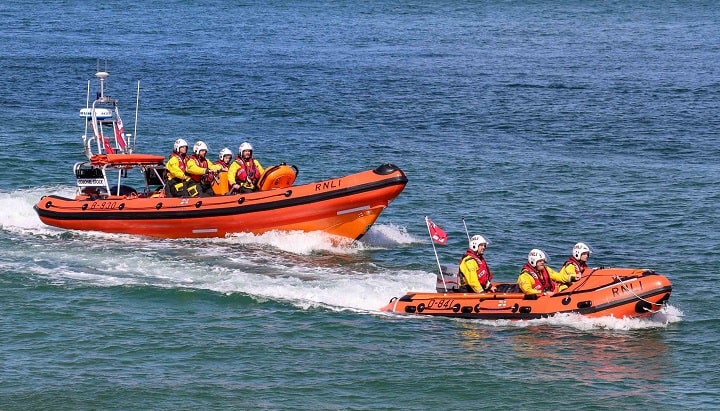
Margate’s two RNLI lifeboats were called out today (July 30) after a jet-ski encountered difficulties in blustery conditions off the Thanet coast.
UK Coastguard was contacted by RNLI lifeguards around 12.30pm after they sighted a jet-ski that appeared to be in difficulties around 800 metres off Botany Bay to the east of Margate. The vessel’s two occupants were observed to be in the sea and separated from their craft at various stages.
With a moderate to fresh westerly wind and choppy seas along with the reliability of the initial report there was concern for the occupants in the water and Margate’s D class inshore lifeboat was tasked immediately, followed by the larger B class lifeboat to provide back-up and additional assistance if required. Margate Coastguard Rescue Team was also tasked to oversee the scene from ashore.
The D class lifeboat was directed to the position by the lifeguards ashore and the disabled jet-ski was quickly located, both occupants now back on their craft. They were taken onboard the lifeboat where casualty care was provided with both occupants suffering from the cold but otherwise unharmed. After assessing the situation the disabled jet-ski was taken in tow to Palm Bay. The craft’s occupants remained on board the smaller lifeboat, escorted by Margate’s larger B class lifeboat which had by now arrived on scene.
The craft and its occupants were landed ashore at Palm Bay and handed into the care of coastguard officers, both lifeboats were released and returned to station.
Christian Wright, Deputy Launching Authority, Margate RNLI said: “There was concern for the two occupants given the rather unpleasant weather conditions but thanks to the rapid response of the lifeboats both were recovered safely.
“Some safety points to note here are to never leave the craft you are on if you encounter difficulties and always have means of calling for help, either a marine VHF radio or mobile phone in a waterproof container in addition to more conventional means such as a pack of distress flares. Seeking local knowledge available at lifeguarded beaches is also advised.”

